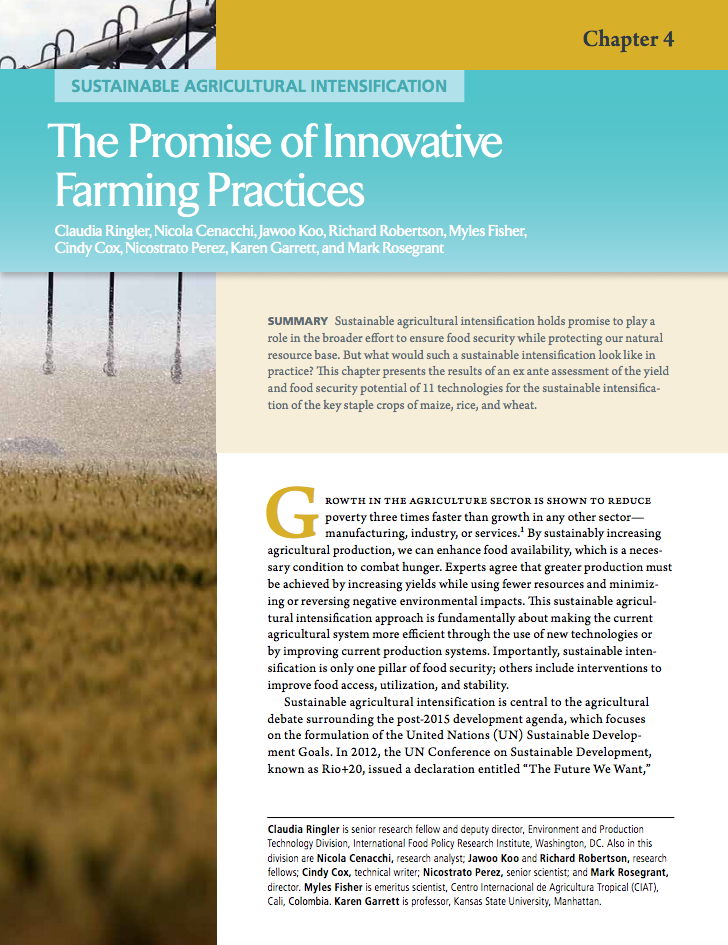Focal point
Location
About IFPRI
The International Food Policy Research Institute (IFPRI) provides research-based policy solutions to sustainably reduce poverty and end hunger and malnutrition in developing countries. Established in 1975, IFPRI currently has more than 500 employees working in over 50 countries. It is a research center of theCGIAR Consortium, a worldwide partnership engaged in agricultural research for development.
Vision and Mission
IFPRI’s vision is a world free of hunger and malnutrition. Its mission is to provide research-based policy solutions that sustainably reduce poverty and end hunger and malnutrition.
What We Do
Research at IFPRI focuses on six strategic areas:
- Ensuring Sustainable Food Production: IFPRI’s research analyzes options for policies, institutions, innovations, and technologies that can advance sustainable food production in a context of resource scarcity, threats to biodiversity, and climate change. READ MORE
- Promoting Healthy Food Systems: IFPRI examines how to improve diet quality and nutrition for the poor, focusing particularly on women and children, and works to create synergies among the three vital components of the food system: agriculture, health, and nutrition. READ MORE
- Improving Markets and Trade: IFPRI’s research focuses on strengthening markets and correcting market failures to enhance the benefits from market participation for small-scale farmers. READ MORE
- Transforming Agriculture: The aim of IFPRI’s research in this area is to improve development strategies to ensure broad-based rural growth and to accelerate the transformation from low-income, rural, agriculture-based economies to high-income, more urbanized, and industrial service-based ones. READ MORE
- Building Resilience: IFPRI’s research explores the causes and impacts of environmental, political, and economic shocks that can affect food security, nutrition, health, and well-being and evaluates interventions designed to enhance resilience at various levels. READ MORE
- Strengthening Institutions and Governance: IFPRI’s research on institutions centers on collective action in management of natural resources and farmer organizations. Its governance-focused research examines the political economy of agricultural policymaking, the degree of state capacity and political will required for achieving economic transformation, and the impacts of different governance arrangements.
Research on gender cuts across all six areas, because understanding the relationships between women and men can illuminate the pathway to sustainable and inclusive economic development.
IFPRI also leads two CGIAR Research Programs (CRPs): Policies, Institutions, and Markets (PIM) andAgriculture for Nutrition and Health (A4NH).
Beyond research, IFPRI’s work includes partnerships, communications, and capacity strengthening. The Institute collaborates with development implementers, public institutions, the private sector, farmers’ organizations, and other partners around the world.
Resources
Displaying 271 - 275 of 1521Africa’s agricultural research pool
Absolute levels of staffing in public agriculture research and development (R&D) vary considerably across the 39 countries in Africa south of the Sahara participating in the Agricultural Science and Technology Indicator (ASTI) survey (Map 1). In 2011, Ethiopia, Ghana, Kenya, Nigeria, South Africa, Sudan, and Tanzania each employed more than 500 full-time equivalent (FTE) researchers.
The political economy of Zambia’s recovery: Structural change without transformation?
Using the case of Zambia, this paper examines whether structural change translates into reduced poverty and improved social welfare through an empirical and systematic analysis of the country’s growth trajectory during 1991–2010. We find that growth after 2002 was accompanied by positive structural change, but most new jobs were in the low-wage, insecure informal sector in urban areas.
Blue and green virtual water flows
Book chapter
Sustainable agricultural intensification: The promise of innovative farming practices
Sustainable agricultural intensification holds promise to play a
role in the broader effort to ensure food security while protecting our natural
resource base. But what would such a sustainable intensification look like in
practice? This chapter presents the results of an ex ante assessment of the yield
and food security potential of 11 technologies for the sustainable intensification
of the key staple crops of maize, rice, and wheat.
The family business: Is there a future for small farms?
The United Nations declared 2014 the International Year of Family Farming. Although many forms of production were once family-based, agriculture is now one of the few that are still dominated by families. Because family farms are so prevalent, making them more productive could help combat poverty and hunger in many rural areas around the world. Family farms are mostly small in scale, but they are highly diverse in other ways, and their pathways out of poverty will vary.




